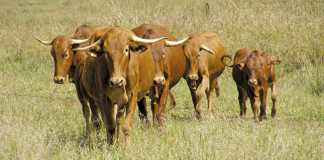What do you farm with and where?
I farm with cattle, sheep, goats and game in the Baviaans River area of the Winterberg mountains in the Bedford district.
What should the main purpose of organised agriculture be?
To further the interests of the country’s commercial farmers.
What are the main threats to farming in the Eastern Cape?
Stock theft, predators, the weather and government.
What are the main farming opportunities in the Eastern Cape?
Crop farming in our high-rainfall areas such as the former Transkei. Game farming has shown a lot of growth in the past few years, as has agricultural tourism.
Why isn’t land reform working?
Because it’s rooted in communal farming ideas, and is driven by politicians who know nothing about farming. Agri Eastern Cape supports sustainable and responsibly executed land reform measures. It accepts that attempts at land reform by previous governments have, almost without exception, been unsuccessful, with a disastrous impact on individuals and communities.
All parties must adhere to the willing-buyer willing-seller principle. Agri Eastern Cape supports the protection of property rights as enshrined in the constitution. It accepts that there are occasions when drastic measures – such as expropriation by the state – can be justified when applied for the common good, but rejects the violation of property rights for any other purpose, such as the acquisition of agricultural land at below market value.
What will make land reform work?
A complete rethink about how it should be implemented. Government’s 30% target makes no sense whatsoever. It’s measured purely in hectares without any regard for agricultural potential, and is based on fictitious assumptions. The most alarming thing about the 30% target is that it keeps on shifting. In 1995 the target was set at 39% of the country’s land surface area, but then it became apparent that this target had already been met once all state-owned land was taken into account.
The target then changed to 30% of all “high-potential agricultural ground” – as outlined in the Agri BEE document of 2005. When it became clear that this target had also been met, it was changed to its present racially based formula of 30% of “white-owned” agricultural land.
We believe this target wasn’t measured correctly. It shouldn’t be measured in hectares, but rather by agricultural potential, as expanded large stock units per hectare. Attaining the present target by transferring an additional 14,8 million hectares of high-potential agricultural land would undoubtedly cause a crisis in the production of all agricultural produce, resulting in severe shortages of essential commodities like food.
It’s therefore suggested that the process be put on hold until existing land reform projects have been restored to their true productive potential. Commercial farmers must provide enough food to carry this country. There’s no other way to do it and politicians must realise this. The various parties have to bridge a cultural divide with this – either go forward, or go back 300 years. We are in the 21st century and we can’t turn the clock back to nomadic pastoralism, which used to be the customary system of tenure.
How is Agri EC’s relationship with black farmers?
My predecessor’s attempts to set up a confederation of farming NGOs means we have good relationships with our emerging black commercial farmers and we’re constantly trying to improve these relations further.
Is rural security under control in the Eastern Cape?
Our rural areas are among the most crime-free in South Africa and we’re both relieved and proud of this.
How does Agri EC plan to handle the ongoing drought?
We need to keep putting pressure on government to implement disaster management plans.
What does your black membership look like?
Still a minority at this stage, but we do want to see black commercial farmers emerge in the Eastern Cape.
How can organised agriculture make a more meaningful contribution to the problems facing agriculture?
We must continue to present our case in a logical and rational way. Eventually somebody will hear what we’re saying.
How do you get the state to work with organised agriculture?
By being persistent, and presenting good, sensible options. South Africa is an emerging industrial nation, with a rapidly increasing urban population. It’s therefore important to keep the commercial farming sector intact and productive to provide food for the urban community that produces very little of its own food.
It’s also very important that the country continues to be self-sufficient in food production, as imports will prove increasingly unreliable and prices fluctuate with the exchange rate. To counter this, and to provide for a growing population, it’s vital that commercial farming in South Africa should prosper and grow. And government and organised agriculture must work together to achieve this.
There seems to be a lot of money being pumped into small-scale agriculture in the Eastern Cape. First this was done through the agriculture department’s Massive Food Programme, and now by the Accelerated and Shared Growth Initiative for South Africa (AsgiSA) Eastern Cape. Is this making any difference?
None that we can observe, as yet.
Are you worried about the prospecting for coal in several of your inland districts?
Yes. There are very few activities other than nuclear fallout that are more destructive to the environment than coal mining. Not only does it cause a lot of damage to the soil, but acid rain and acid water also contaminate water sources on mined land and on neighbouring properties through seepage.
What is the situation as far as land claims are concerned? Have you had any joy with the regional offices?
Our regional office is as intransigent as those of other provinces, and is creeping along at the pace of a drunken snail. We intend serving papers on it shortly in the hope of speeding it up.
Is preventing Rift Valley fever a priority, and if so, do you have any ideas on how to go about this?
In the light of the embargo placed on our wool and mohair exports by China, I think it’s high time our agriculture minister stepped in to distribute free vaccine on a large scale to all farmers. If she doesn’t, there’ll be a disaster, particularly in communal farming areas.
The Eastern Cape seems to be hammered by livestock diseases. What is the situation like with your state vets?
Personally, I haven’t seen a state vet for years. Have they become extinct?
What do your game-farming members make of the state’s view about this form of farming not being productive?
They see this as a threat to their businesses. Government must try to remember that farmers have gone in this direction only because it has made no effort to ensure that alternative types of farming – such as livestock – remain profitable. In the end, money (and not the politician) talks.
Contact Ernest Pringle on 072 297 7840 or e-mail: [email protected].













